Soft Machine were one of the greatest UK avant/jazz-rock bands of all time and their work continues to be name-checked by today's hip experimentalists.
"Soft Machine were the grooviest, coolest psychedelic band of the era..."
- Phil Manzanera
"Soft Machine...certainly rank among the most influencial 'out' rock bands."
– Dusted
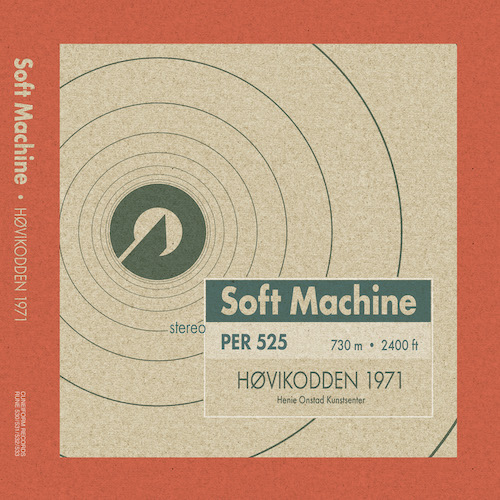 HØVIKODDEN 1971 RUNE 530/531/532/533 |
"Immediate and subtle,
coming as the quartet was near to imploding, it encapsulates everything
the band had to that point and somehow more." – Zoning / Marc Medwin Høvikodden 1971 press release |
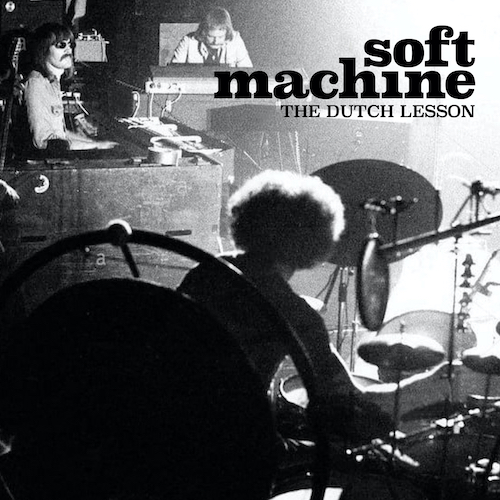 THE DUTCH LESSON RUNE 490/491 |
By 1973 Soft Machine already had a long history of playing in Rotterdam, appearing at major festivals such as Hippy Hippy Fair (1967), Kralingen (1970) and AHOY (1971, Phil Howard’s debut), and no less than four times at the city’s most prestigious venue, De Doelen, most recently (in September 1972) on a double bill with Robert Wyatt’s Matching Mole. This time, however, they were booked in a smaller venue, which they filled to capacity at around 400. Part of an arts complex originally known as Ons Huis, De Lantaren had recently been renovated into a theatre and music venue. In attendance that October night was Bert Boogaard, a record store owner at the time, sitting in the front row with a Uher portable tape machine, and we have him to thank for this excellent ambient recording of the performance, only marred by occasional saturation in the drums. But Boogaard can be excused for not anticipating how powerful and loud John Marshall’s playing would be. This recording contains some of his most unashamedly “rock” drumming, likely egged on by Roy Babbington’s frequent use of a fuzz pedal on his bass, a long-time Soft Machine signature. The band as a whole is a real powerhouse, nowhere better exemplified than on the encore, an infectiously funky fuzz organ-led jam based on the “Gesolreut” riff. Generally the tempos are much faster than usual, making the originals feel leisurely in comparison (“371/2” is a case in point), and even when they aren’t, as with “The Soft Weed Factor,” an unexpected switch to double time makes up for it. Within a couple of weeks of this Dutch mini-tour (a double-bill with local Canterbury disciples Supersister at Amsterdam’s Concertgebouw, at the time featuring Marshall’s future Colours bandmate Charlie Mariano on sax, followed the next day), Soft Machine would enter a new phase of its history when, initially for a one-off Musicians’ Union workshop, the quartet teamed up with guitarist Allan Holdsworth (like Marshall, Jenkins and Babbington formerly of Nucleus, although only the latter was still a member when he joined it), a successful experiment repeated on two dates in Ireland before Holdsworth was made a full member in time for the band’s Christmas Party at the Roundhouse. Expanding
the line-up to a quintet was to prove what had been needed to propel
Soft Machine and its music to the next level. The amount of overdubbing
on Seven, itself evidence that something was missing in the
band as it was, probably accounted for the resulting material not
working in a live context with just four people. But although the fifth
man would change several times in the interim, the quartet of Mike
Ratledge, Karl Jenkins, Roy Babbington and John Marshall would remain
in place for nearly three years, until Ratledge’s departure in April
1976—a very long time by Soft Machine’s standards, and a sure sign of shared musical affinity. |
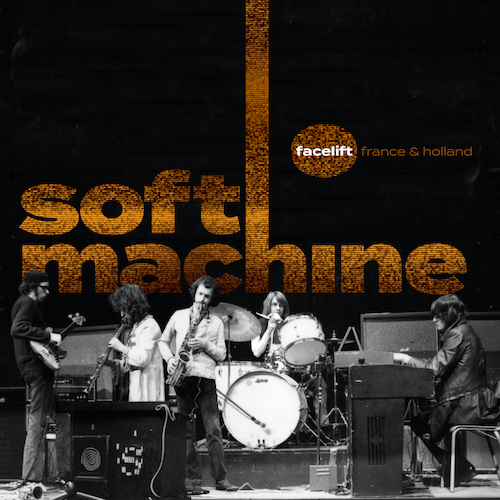 FACELIFT FRANCE AND HOLLAND RUNE 495/496/497 |
As broadcast on the French TV programme Pop 2, the film of Soft Machine’s concert at Paris’ Théâtre de la Musique, which constitutes the main course of the present release, stands as an exceptional document of the band at, arguably, its artistic peak. It is also the only video footage known to exist of the quintet line-up that was active from January to March 1970, and contains the only professionally-recorded performance of “Out-Bloody-Rageous” with Lyn Dobson on second sax, as well as the only professionally-recorded alternative performance by the quintet of “Facelift” . Until the release, nearly 30 years later, of Noisette (Cuneiform), “Facelift” on Third (itself edited to include segments from other studio and live tapes) had remained the quintet’s sole recorded legacy. Noisette presented the rest of the Fairfield Halls concert of January 4, 1970 captured by sound engineer and band friend Bob Woolford, and has often been singled out as the best of the many Soft Machine archival releases. Another album, Breda Reactor, was taken from a poorly recorded Dutch gig later that same month, with an identical setlist save for the inclusion of a brief section of the future “Out-Bloody-Rageous” during “Esther’s Nose Job.” By the time of the Pop 2 performance, it had grown into the Ratledge tour-de-force that would later occupy the last side of Third. Another new Ratledge composition—then untitled but soon to become the first half of “Slightly All the Time”—was unveiled on the French tour. Unfortunately, as the audience recording of the Théâtre de la Musique concert (included as a bonus on the DVD) reveals, this, along with nearly half of the second set, was left out of the edited broadcast (compared to just five minutes from the admittedly much-shorter first set, i.e., “Mousetrap” and “Noisette”). Because of its historical significance and despite its inferior sound quality, “Slightly All the Time” has been inserted back into the performance as presented on Disc 1, along with a brief excerpt of “Moon in June” which smoothens the transition to Robert Wyatt’s vocal improvisation. And to make this release an even more complete representation of Soft Machine’s live set during this period, Disc 3 presents a previously unreleased performance at Amsterdam’s Concertgebouw from January 1970 from a soundboard source. Heard in excellent sound are Hugh Hopper’s “12/8 Theme” (never recorded in the studio, and save for Hugh’s solo rendition on Monster Band, unheard until Noisette) and a complete “Esther’s Nose Job,” unlike the truncated version shown in Pop 2. Pop 2, which aired from April 1970 to December 1973, was the brainchild of producer Maurice Dumay (a former program manager for Europe 1 radio), who chose to surround himself with a young team spearheaded by director Claude Ventura, whose innovative, reportage-like camera work had already been a trademark of Tous en Scène, recently taken off the air for blasphemy. That a French TV show about rock music should choose to devote its entire premiere, as well as another subsequent edition, to Soft Machine, may seem incredible in retrospect, and probably merits an explanation.
The band's love story with France had begun in the summer of 1967, when the original lineup had somehow found itself providing live musical accompaniment to happening artist Jean-Jacques Lebel's production of Picasso's Le Désir attrapé par la queue during its ill-fated sojourn on the French Riviera. The play became that summer's succès de scandale, and made “La Machine Molle” instant stars: Eddie Barclay hired Soft Machine for his ultra-hip Nuit Psychédélique in Saint-Tropez, and leading magazine Le Nouvel Observateur promptly dubbed them “the new Beatles.” When they crossed the Channel again to perform at the Paris Biennale that autumn, they were duly invited to appear on several high-profile TV shows (Dim Dam Dom, Caméra III, Bouton Rouge), and by the time they played at La Fenêtre Rose—France's answer to London's 14-Hour Technicolor Dream—in November 1967, their status as one of the top British groups was established. Despite disappearing for the whole of 1968, first touring America with the Jimi Hendrix Experience and then temporarily disbanding, when Soft Machine returned to Paris in June 1969 to headline a festival at the Bataclan showcasing the new generation of French bands, they had lost none of their popularity, and once again they appeared on French TV's rock programs of the day—Forum Musiques and the above-mentioned Tous en Scène.
The band's commercial potential seemed big enough to its French agent Norbert Gamsohn that he set about organizing a major tour of the country's new Maisons de la Culture circuit. Such was the scale of the eventual itinerary—over 30 dates, divided into two legs, the first in December 1969, the second in February–March 1970—that it allowed the trio to afford what they'd been contemplating for a while already: add a brass section, mostly borrowed from the Keith Tippett Group. Regrettably, that septet line-up was already history by the time the second leg took place: for practical as well as economic reasons, it had been trimmed down to a quintet.
The venue chosen for the Soft Machine’s Paris concert was the Théâtre de la Musique, originally (and better) known as La Gaîté-Lyrique. A fine example of Second Empire architecture, it had been built in the early 1860s, soon becoming Paris' most popular showplace when it hosted Offenbach's most famous operettas. With some notable exceptions like the 1918 Ballets Russes season, the 20th century proved less sympathetic to the theatre, which by the early 1960s, lay virtually abandoned as a music venue. It was briefly revived in 1970, and in addition to the Softs, the venerable 1,500-capacity hall also hosted memorable concerts by Magma and Gong. Various attempts at reviving the venue, including as a museum, were short-lived, although recently, it began hosting concerts (and other events) again as La Gaîté-Lyrique. In order to accommodate the program's 40-minute format, the edited concert was broadcast in two segments: the first on its April 30 premiere, and the second on July 23, ostensibly to coincide with the band's scheduled (but ultimately cancelled) midsummer appearances in several festivals in the South of France.
There is little to fault with either the sonics or visuals of the footage—the occasional, disconcerting and annoying outbursts of fake applause and cheers, mixed in at seemingly random intervals on the original broadcast, have been minimized here, thanks to the discovery in the INA archives of an earlier, work-in-progress edit of the first set and, wherever else the issue manifested itself, using the audience source as patches. All in all, no effort has been spared to ensure that this is the best this performance has ever sounded and looked.
And good it certainly looks. There is a cinematographic quality to Ventura's choice of unusual camera angles, for instance when he films the band from behind the stage, capturing otherwise unseen activity—like Softs roadie Tony Wigens chatting with Elton Dean or maneuvering Robert Wyatt's overhead mic in time for his scat solo during “Esther's Nose Job.” Yet his camera never strays away from the main action for too long. The visual dimension adds much to the enjoyment derived from the music. One gets a better sense of Wyatt's physical abandon, both as drummer and singer—his Echoplexed vocal improvisation here, graced with uncharacteristically sympathetic backing from the rest of the group, is among his best; of the introverted yet asserted presence of Ratledge and Hopper; and of the surprisingly well-behaved playing of dual saxists Dean and Dobson—although the latter gets quite a bit wilder during the drone section in “Facelift.” Oddly enough the only drinks in sight are Orangina bottles, prominently displayed on top of the amps in lieu of the usual beer—clearly not your average rock group! Let’s leave the final word to Lyn Dobson, who left the band soon after this performance. “I think that what Soft Machine did was totally original. Robert, Hugh and Mike.… Between them it was a fantastic combination. There was a kind of chemical difference between them, but it was out of that tension that something amazing happened. Later it became more watered down, more like everything else that was around—what they called jazz-rock. But what we did was something else altogether.… More like rock-jazz, if you like. Very powerful music!” Indeed. Facelift France and Holland press release |
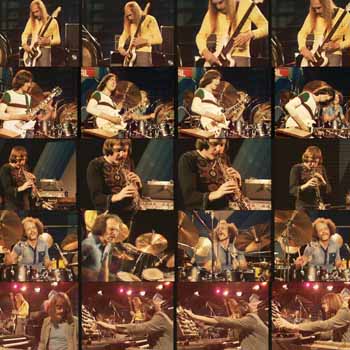 SWITZERLAND 1974 RUNE 395/396 |
"...a more historically important document of this powerful & vibrant band is difficult to imagine. In July 1974, the Softs were on a lucky streak. ...they had achieved a kind of renaissance. ...Switzerland 1974 is now the way to hear a group scaling the proverbial heights." – Dusted Soft
Machine were one of the greatest UK avant/jazz-rock bands of all time
and their work, whether their earliest performances as a psychedelic
band, who were contemporaries of, and shared stages with Syd Barrett's
Pink Floyd and the Jimi Hendrix Experience, all the way to being one of
Europe's best known 'fusion' bands, their work continues to be
name-checked by today's hip experimentalists. |
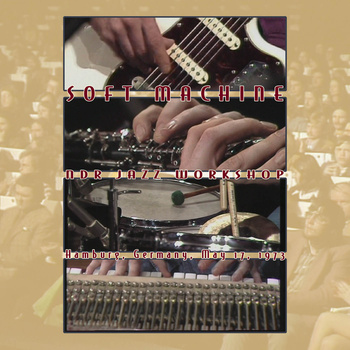 NDR JAZZ WORKSHOP RUNE 305/306 |
Released for the very first time here is the Soft Machine's television broadcast, recorded for Germany's famous "NDR Jazz Workshop"
on May 17, 1973. This performance was one of the earliest shows by the
quartet of Roy Babbington (electric bass), Karl Jenkins (oboe, baritone
sax, soprano sax, electric piano), John Marshall (drums) and Mike
Ratledge (electric piano, organ). This was a very high profile
appearance by the group and for this performance Soft Machine made it a
special show. They performed a set of their repertoire in their quartet
format and then for the second set they were augmented by two guests:
guitarist Gary Boyle (who had just started Isotope) and saxist Art
Themen. This addition brings an exciting & different sound to the
repertoire and make this more than 'just another live release'.
Additionally, Hugh Hopper had just left the group, but he makes an
guest appearance (unfortunately audio only) performing 1983; the only
known live version of this composition. This long sought-after
performance has never been seen since its original broadcast over 35
years ago, not even in poor quality bootlegs. It is the single best
quality video document that exists of the group, featuring clear and
beautiful visuals and superb live stereo sound. The film footage is so
clear and sharp that you can actually see the tape loops that Hugh had
set up, hanging from the scafolding next to the band and you can read
the address on the box next to Mike Ratledge's echoplex! |
 MIDDLE EARTH MASTERS RUNE 235 |
The Soft Machine were one of England's original and best psychedelic bands, emerging out of the same "UFO Club" London scene at the same time as Pink Floyd. While the band would always undergo constant personnel and stylistic change, their best known lineup in their psychedelic days was the trio of Kevin Ayers-bass, guitar, vocals, Mike Ratledge-organ and Robert Wyatt-drums, vocals. They played many shows and built an audience in “swinging London” and beyond. A link with Jimi Hendrix’s management culminated in the Softs touring the USA with the Jimi Hendrix Experience two different times in 1968, playing over 60 shows as their opening act and recording their first album while in the USA during their touring, after which the band collapsed and disbanded...temporarily. Middle Earth Masters captures the 1967-era Soft Machine trio in full concert glory, recorded live at London's legendary Middle Earth club. The performance is unbelievably freaky for 1967, with songs that feature unusual structures linked by wild solos and improvisations. Those of you who know and love the first Soft Machine album will be amazed at how much more insane and insanely loud the band actually were and also surprised to hear that Mike Ratledge was doing the crazy solo fuzz organ parts (ala the opening of Facelift) in 1967. Includes rare, previously unissued photographs and a short essay by Michael King about these tapes and his work to make them sound as good as possible. IMPORTANT:
The source tapes for this CD were recorded using semi-pro equipment
under difficult conditions, at extreme volume in a concrete basement.
Considering their age, their rarity, and the technical limitations of
sound reinforcement of 45 years ago, we feel that the music presented
is very enjoyable! What this means in plain English is that the
recording accurately presents the sound of a very loud band playing
with an inadequate PA for the vocals. The band itself is very clearly
recorded, but the vocals are often very low in the mix. |
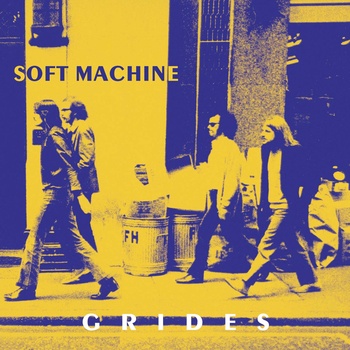 GRIDES RUNE 230/231 |
Soft
Machine were one of first and one of the greatest jazz/rock bands of
all time. Their importance and influence was especially great in
Europe, where they influenced several generations of bands, and their
influences can still be heard to this day in bands like Jaga Jazzist
and beyond. Grides presents the most famous version of the band (Elton Dean, Hugh Hopper, Mike Ratledge, Robert Wyatt) recorded live at the Concertgebouw in Amsterdam on October 25, 1970, in a high-quality, previously unreleased recording, just a few months after the release of Third and at the peak of their popularity. It showcases them in transition between releases, with the band performing 3 of the four works from Third, as well as some of the earliest recordings of material from the upcomming Fourth, including some very different arrangements to what would eventually end up on that release. In addition, it features the earliest recording of Elton's Neo-Caliban Grides, which has a fairly lengthy composed section that was never heard again. Also included in this set is
the first-ever DVD release by Soft Machine! It was recorded at the TV
studios of Radio Bremen on the same date (March 23, 1971) as the radio
session that Cuneiform released as Virtually, but is a completely
different performance. This was the band's final European tour with
Robert Wyatt and is a 20 minute set, professionally recorded by a
multicamera crew. The audio and video quality is excellent for the time
period (over 35 years old now!), as we worked from the original
videotape master in the archives of Radio Bremen. Bottom line: another
excellent and essential archival release from a great band! |
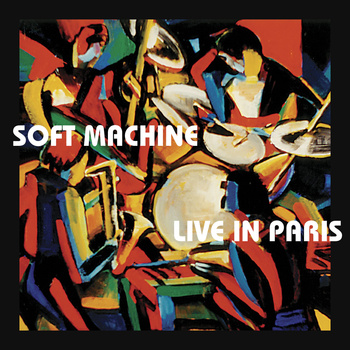 LIVE IN PARIS RUNE 195/196 |
The
Soft Machine line-up of Elton Dean, Hugh Hopper, John Marshall and Mike
Ratledge lasted under half a year and recorded just one half of an
album (side two of "5"). Live in Paris is a
rare recording of this quartet during that lineup's final days; Dean
left Soft Machine later that month. It is also a special, rare example
of a Soft Machine concert recorded and released in its entirety. Live
in Paris shows Soft Machine playing in top form. As Aymeric Leroy
points out in the liner notes, "the music illustrates main composers
Ratledge and Hopper's shift in compositional style towards looser and
more minimalistic themes." The tracklisting consists of works from
"Third" and "5" in often significantly different versions, as well as
several piece not recorded elsewhere. This excellent quality release is
taken from the less than 2 dozen shows performed by this version of the
band, and shows that despite such a short life, that this version of
the quartet definitely had their own style and sound. "The
Cuneiform label continues with its excellent job of documenting obscure
and sought after Soft Machine recordings from the late '60s and early
'70s." – Jazzwise |
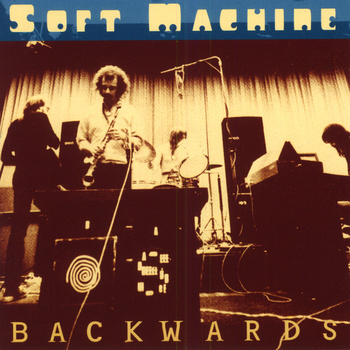 BACKWARDS RUNE 170 |
Backwards
is the fourth in our Soft Machine archival series. While I am really
proud of all of our Soft Machine releases, this one is really special
& something perhaps even close to magnificent. Backwards is
comprised of recordings from three different and interesting eras of
the band: First on the CD is a recording of the quartet from May, 1970,
made just about the time that the band had finished recording their
Third album. The recording is mono, but the sonic quality is superb;
this may be the single finest recording of the quartet version of the
band, surpasing even their official studio relases. Next is two
performances from November, 1969, featuring the septet version of Soft
Machine. Since the only other available material by this version of the
band is 20' of BBC recordings, this is an invaluable addition to the
band's recorded legacy. Lastly there is Robert Wyatt's original demo of
"Moon In June", which would eventually appear on Third. The first half
of this demo version was recorded in the USA in the fall of 1968, after
Soft Machine had disbanded after their 2nd US tour, but before the band
reformed for their 2nd album. Then, in 1969, the trio version of Soft
Machine recorded the ending to their piece, and spliced on the final
half. As I said before, this one is special, & anyone remotely
interested in what was happening in English progressive music-jazz/rock
(before it became known as jazz/rock) should be extremely happy with
this release. "...a magnificent document of one of the most vital jazz/rock fusion outfits to ever come down the pike." – ejazznews |
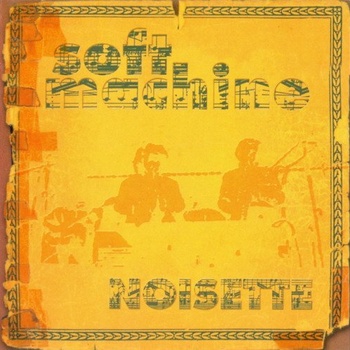 NOISETTE RUNE 130 |
Noisette
is the third in our Soft Machine series, recorded January 4th, 1970 at
the same concert as "Facelift" on Third, by the short-lived quintet
formation of the group: Elton Dean & Lyn Dobson-reeds, Hugh
Hopper-bass, Mike Ratledge-keyboards & Robert Wyatt-drums &
vocals. Noisette features the rest of the concert, & showcases a band in transition from their earlier psychedelic/ progressive sound towards the jazz rock sound of Third & Fourth. It features the quintet performing versions of material from their 1st two albums as well as material not available on their studio albums. Mastered directly off of the 40 year old 15ips master tapes, this release boasts superb live sound for the time period, & includes rare, unseen photos and liner notes by Aymeric Leroy. "...Britain's best answer to electric Miles Davis" – Pulse |
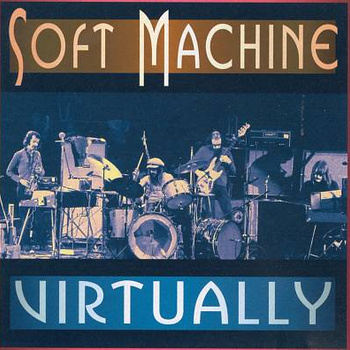 VIRTUALLY RUNE 100 |
The previously unreleased show captured on Virtually,
recorded 3/23/71, presents the classic quartet Softs [Elton Dean/Mike
Ratledge/Hugh Hopper/Robert Wyatt] during their final European tour
& just 4 months before their dissolution. The recording [licensed
from German radio & taken from the master tapes] is superb for the
time period, & the performance really sparkles, with everyone
shinning, although special note must be made of Robert's drumming, as
he plays with more gusto on this show than most from this period. With
versions of all the tracks from Fourth, most of Third and much more,
this 78' release, which captures the entire concert, is absolutely
essential for any Soft Machine fan. "...an innovative union of jazz and rock." – Downbeat |
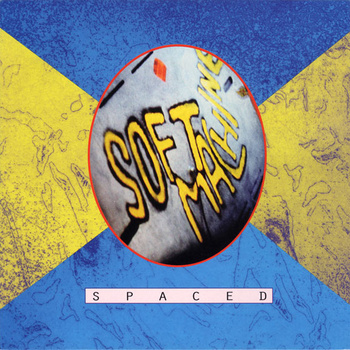 SPACED RUNE 90 |
Spaced
is previously unreleased studio recordings recorded in early/mid 1969
by the "classic" Soft Machine trio line-up of Hugh Hopper [bass], Mike
Ratledge [electric piano/organ] and Robert Wyatt [drums]. These heavily
manipulated/ looped/etc. recordings were originally presented as the
backdrop to a multi-media work entitled Spaced. After it's week-long
performance, the tapes were forgotten for over two decades until
rediscovered by Mike King. These recordings feature the band at their
most radical, and while they would never again use the studio in such
an extreme fashion, the work done here definitely influenced later
works such as Third and Hugh's 1984. With liner notes by Hugh and Bob
Woolford. "...Spaced encapsulates an invigorating divination of gloomy psychedelia/Kluster-meets-Albert Ayler freedom...it sounds like psilocybin heaven." - The Wire "Radically savage or wot! But I still like it." - Hugh Hopper, upon hearing the tapes for the 1st time since 1969. |

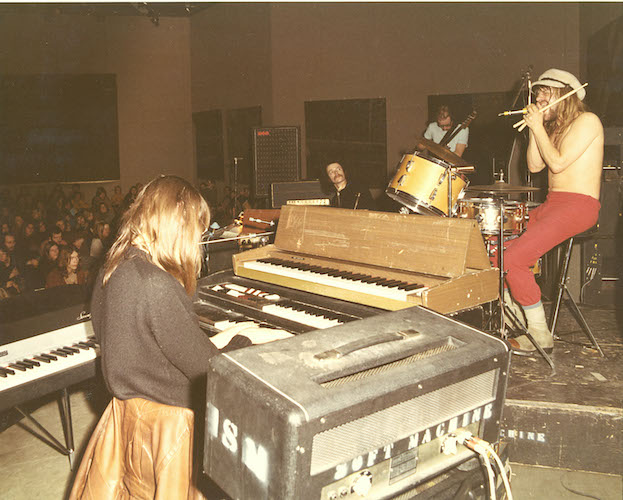
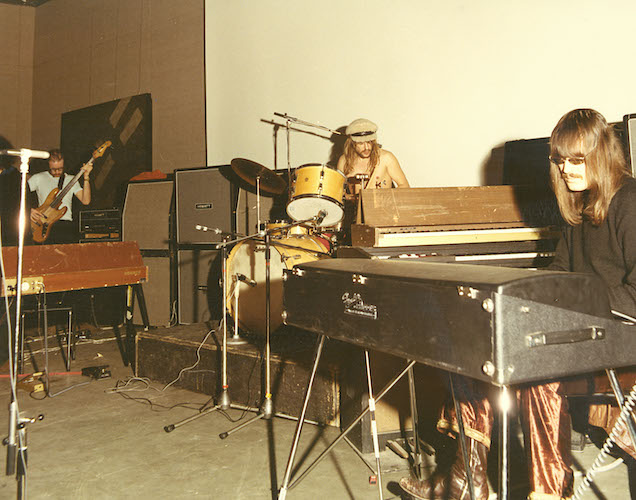
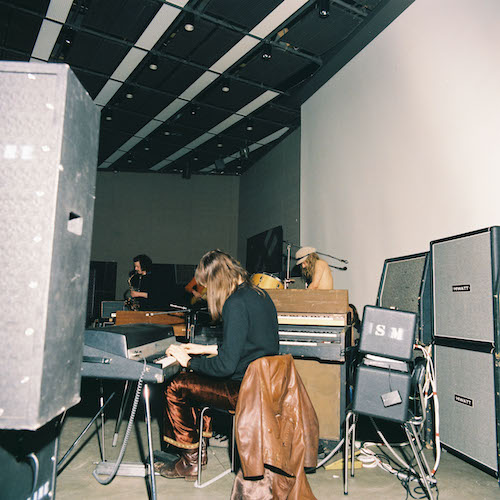
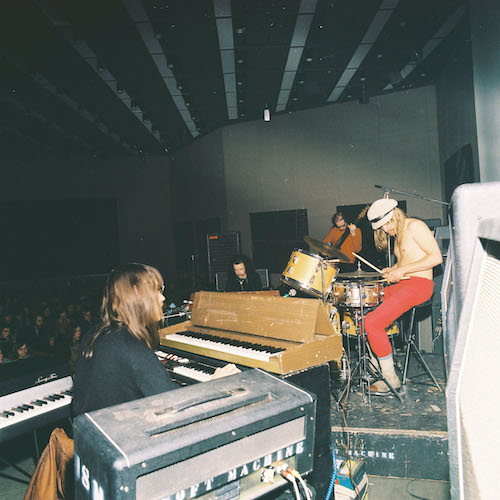
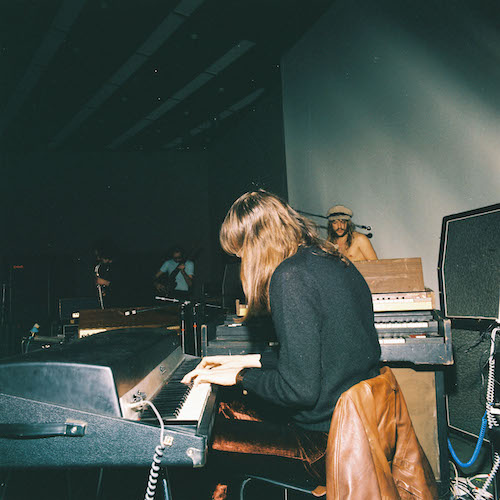
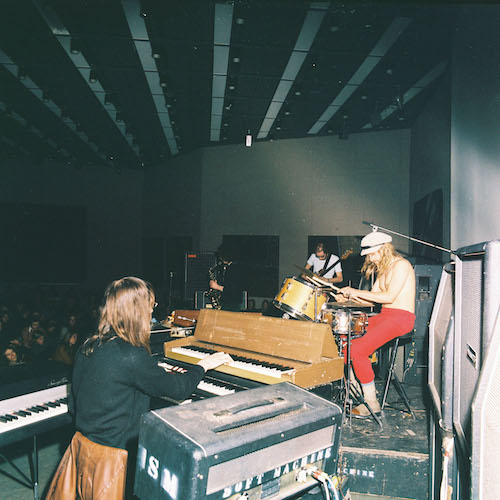
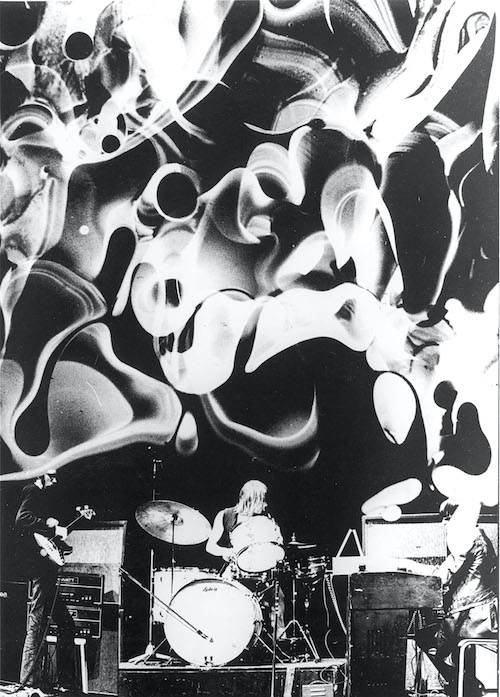
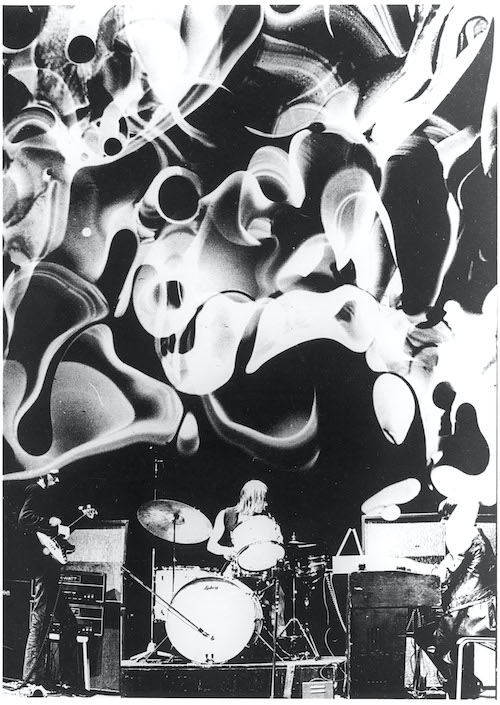
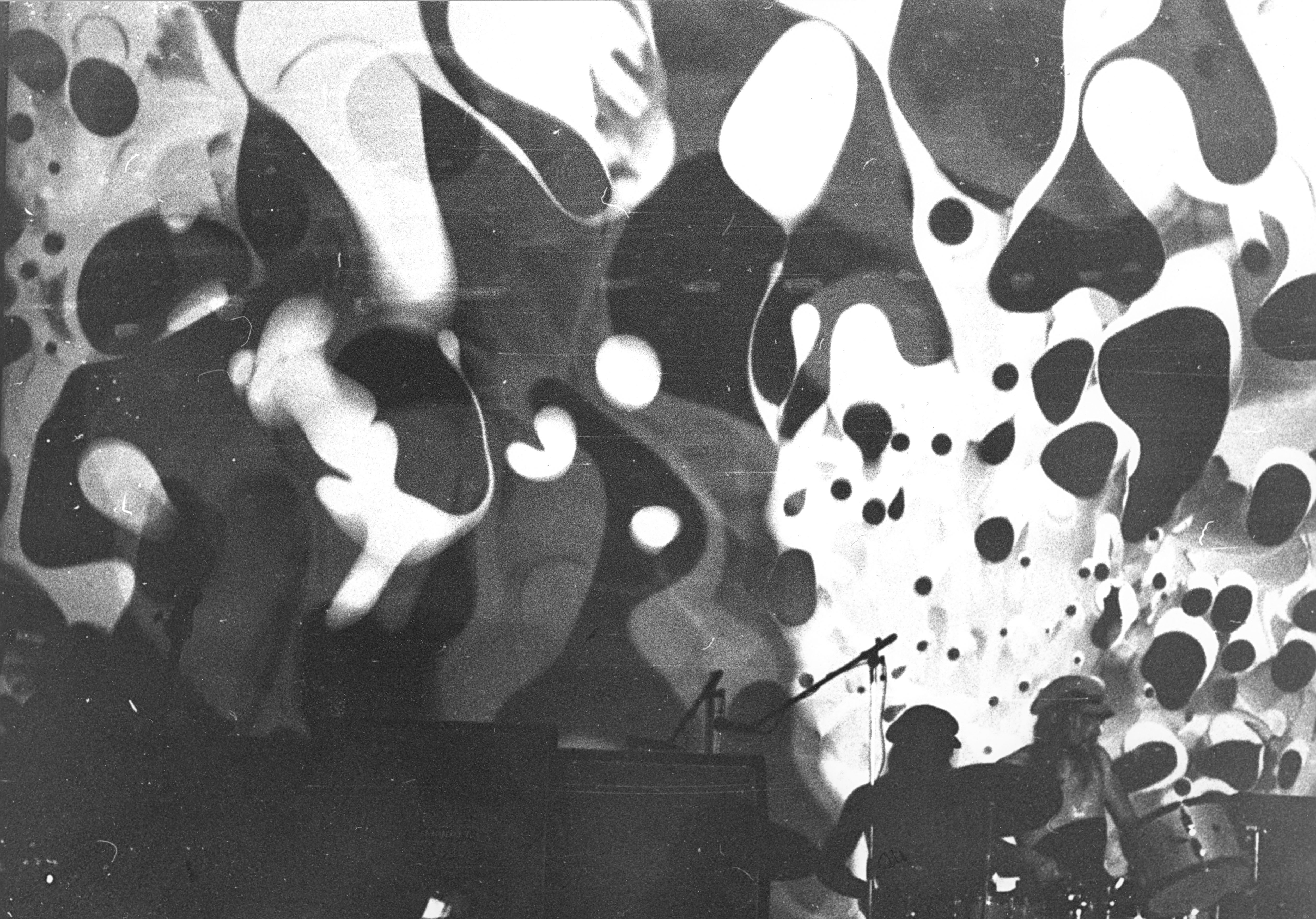
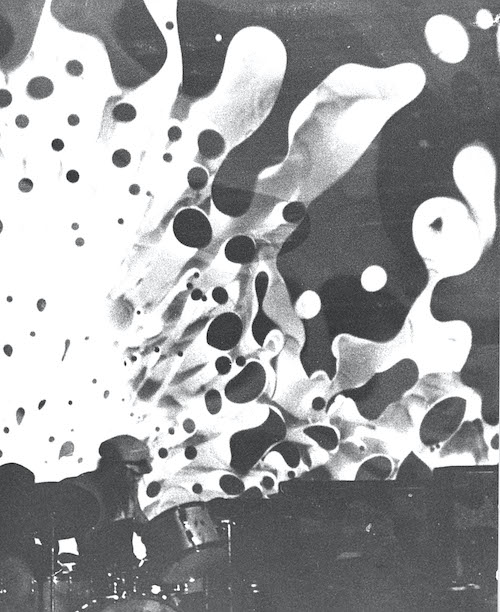 The Dutch Lesson
The Dutch Lesson
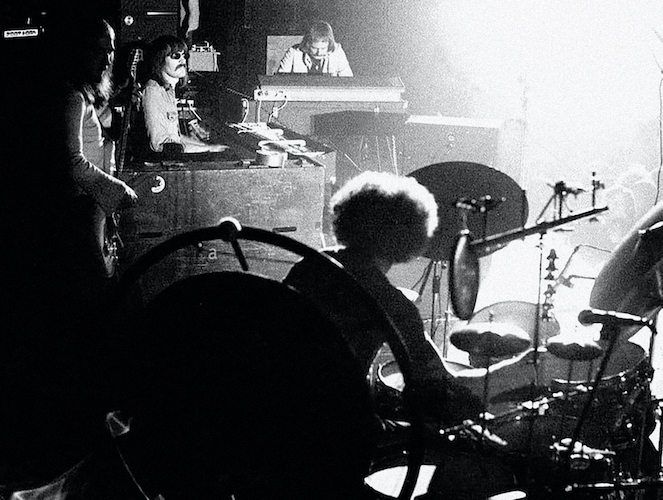
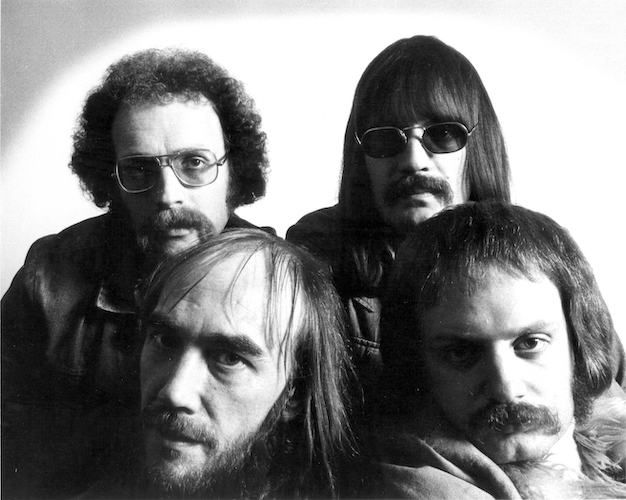 Facelift France and Holland
Facelift France and Holland
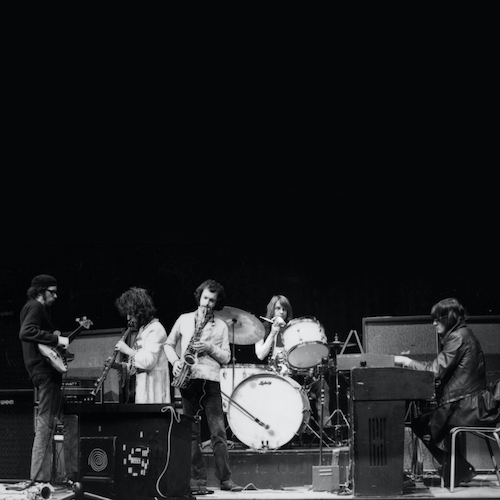
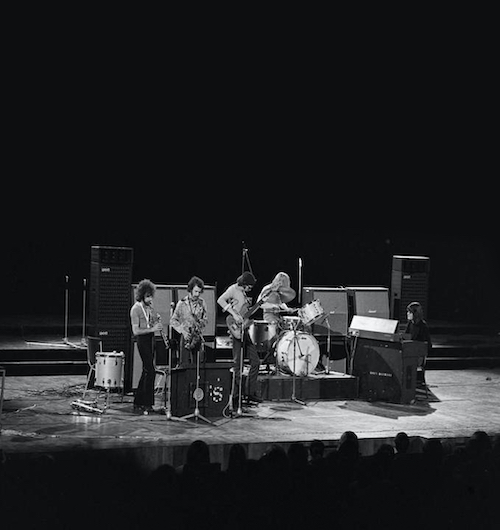
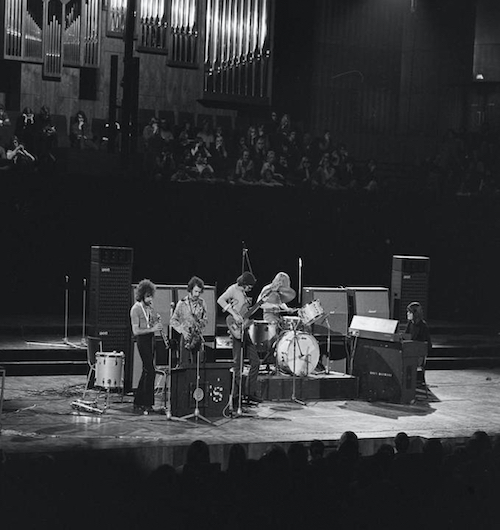
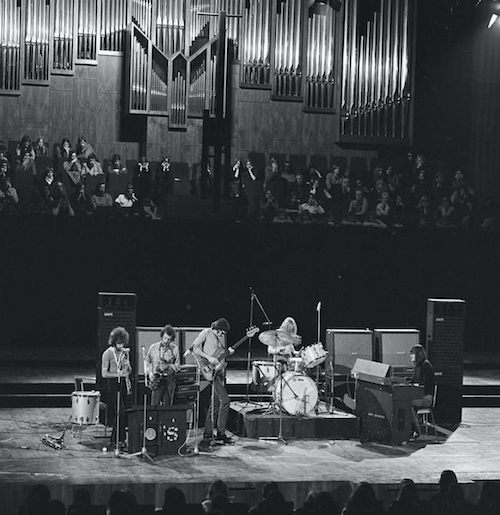
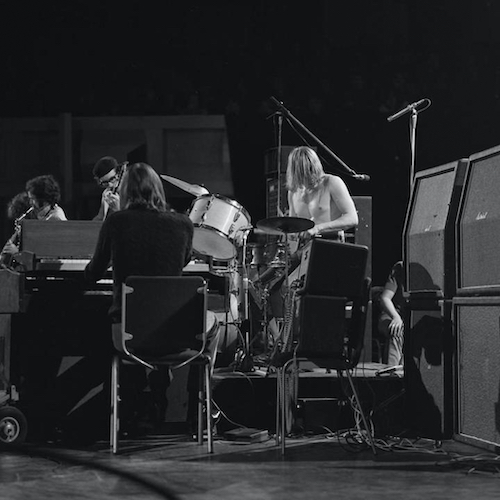
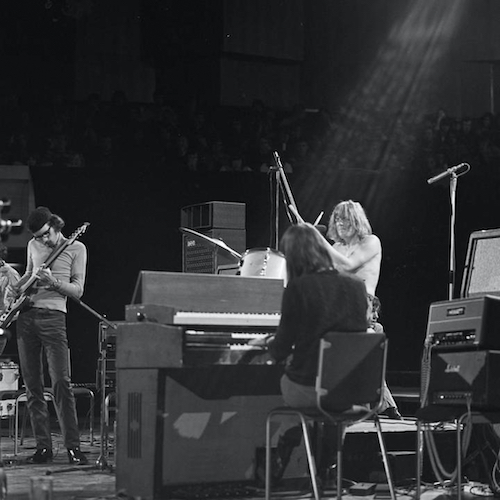
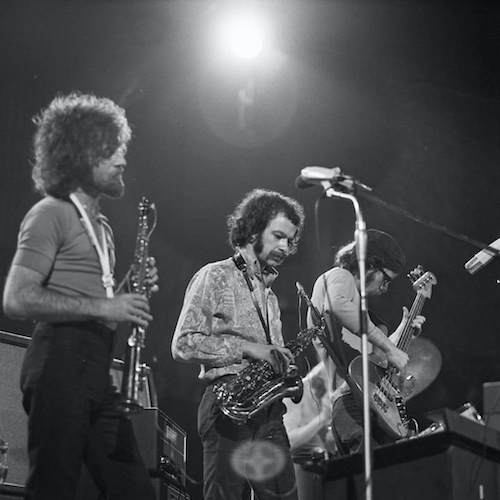
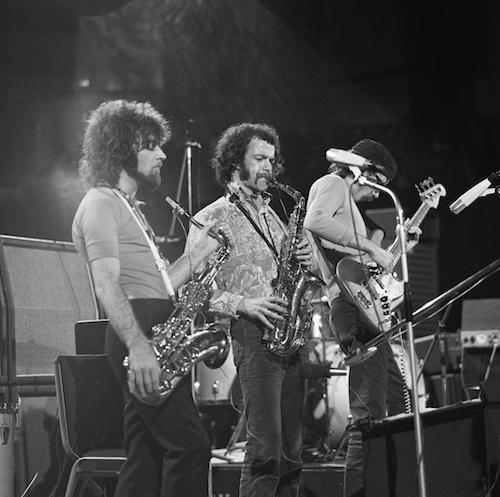
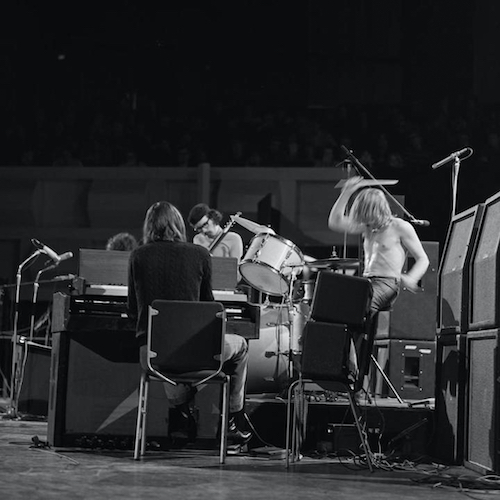 Switzerland 1974
Switzerland 1974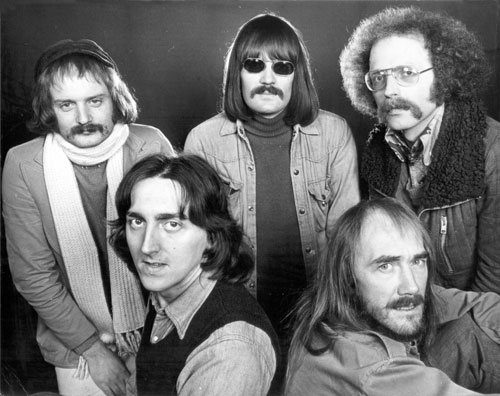

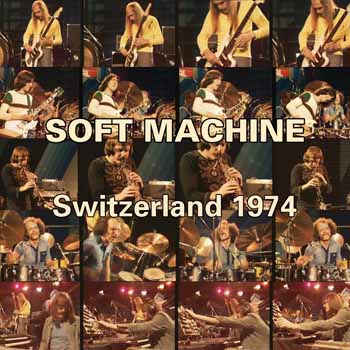 NDR Jazz Workshop
NDR Jazz Workshop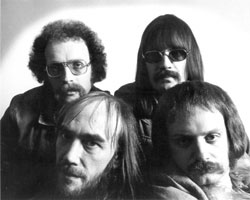
 Middle Earth Masters
Middle Earth Masters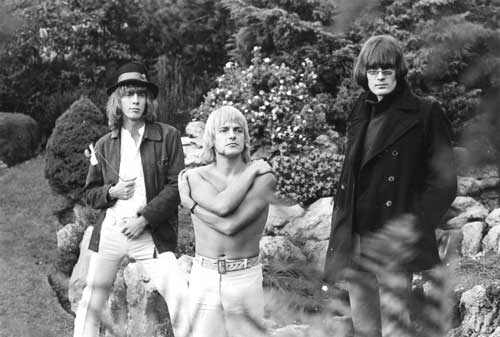

PRESS RELEASES
Høvikodden 1971 press release
The Dutch Lesson press release
Facelift France and Holland press release
NDR Jazz Workshop press release
Middle Earth Masters press release
Soft Machine press quotes
